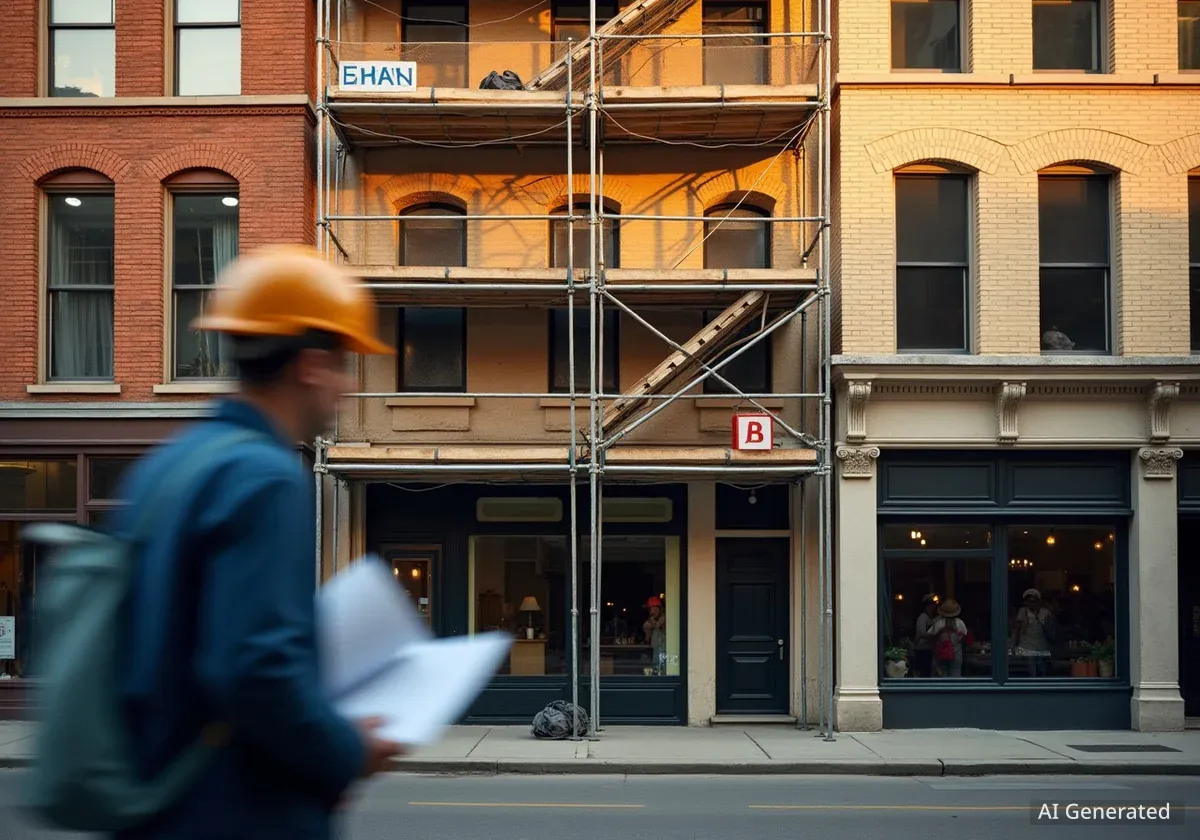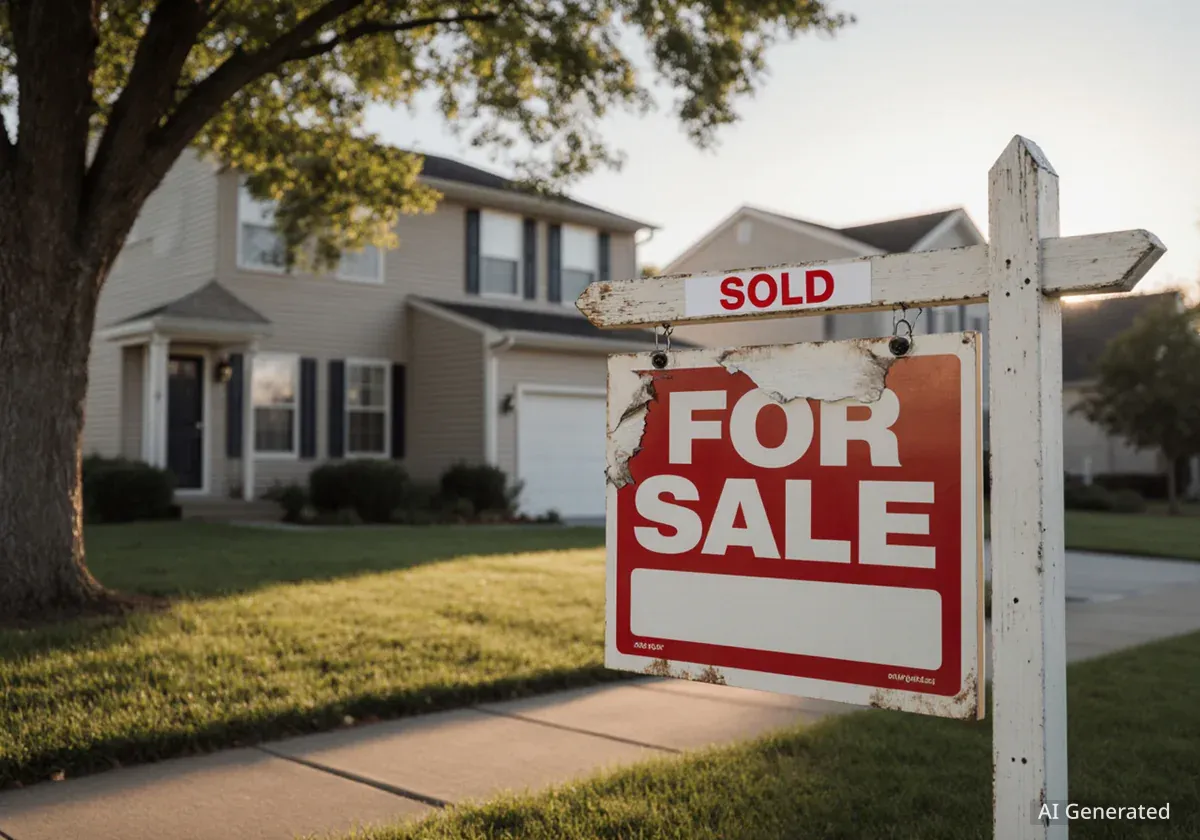Real estate executive Turner Woodard has extended his commitment to historic preservation into Carmel, Indiana, following the successful redevelopment of multiple landmark properties. This expansion includes the adaptive reuse of three significant commercial buildings, funded in part by the 2021 sale of the iconic Stutz Motor Car Co. factory in Indianapolis.
In addition to his development work, Woodard recently made a significant philanthropic contribution, donating $100,000 to Indiana Landmarks, a statewide organization dedicated to saving historic places. The donation underscores a long-held passion for revitalization that is now reshaping key areas in Carmel.
Key Takeaways
- Real estate executive Turner Woodard donated $100,000 to the preservation group Indiana Landmarks.
- Woodard is applying his adaptive reuse strategy to three properties in Carmel, Indiana.
- The Carmel investments followed the 2021 sale of the historic Stutz Motor Car Co. factory in Indianapolis, a major preservation project he led.
- Repurposed Carmel buildings now host new businesses, including a recreational facility and office spaces, contributing to local economic activity.
A Commitment to Preservation and Community
Turner Woodard has long been a key figure in Indiana's historic preservation community. His recent $100,000 donation to Indiana Landmarks continues this legacy. The contribution was made in honor of Marsh Davis, the organization's former president, and was presented in the name of the Woodard Van Riper family.
This philanthropic gesture is consistent with Woodard's hands-on approach to saving and repurposing historic structures. He believes that restoring old buildings can serve as a catalyst for broader neighborhood improvement.
“Preservation works in many ways, but certainly to stimulate neighborhoods where you start fixing up one thing, fixing up another, and hopefully that catches on,” Woodard explained. “That’s a real driving force, and that’s kind of how it happened.”
This philosophy has guided his work for decades, transforming neglected properties into valuable community assets.
The Roots of a Lifelong Passion
Woodard's interest in preservation was influenced by his mother, Edna, who was also a dedicated preservationist. This early exposure to the value of historic architecture was complemented by another passion: vintage automobiles. His love for classic cars, which includes his own racing team in the Sportscar Vintage Racing Association, translated into an appreciation for the craftsmanship and history embedded in old buildings.
He saw a parallel between restoring a vintage car and revitalizing a historic structure. Both require a vision for what an aged asset can become, along with the dedication to bring that vision to life. This dual interest has defined his professional and personal pursuits.
The Stutz Factory A Landmark Indianapolis Project
Perhaps the most prominent example of Woodard's work is the Stutz Motor Car Co. factory in Indianapolis. In 1993, he acquired the sprawling 400,000-square-foot complex at 1060 N. Capitol Ave., saving it from potential demolition.
About Adaptive Reuse
Adaptive reuse is the process of repurposing a building for a function different from its original intended use. This approach preserves the architectural and historical character of a structure while giving it a new, modern purpose. It is considered a sustainable development practice, as it reduces construction waste and conserves resources.
Instead of tearing it down, Woodard transformed the former car factory into a vibrant hub for small businesses and artists, creating a dynamic incubator for local enterprise. For nearly three decades, the Stutz Business and Arts Center was a cornerstone of the downtown Indianapolis revitalization effort.
In 2021, Woodard sold the property. The sale marked the end of an era for his involvement with the Stutz but provided the capital for his next chapter of preservation work. For tax purposes, the proceeds needed to be reinvested into similar properties, which led him to explore new opportunities in the suburban city of Carmel.
New Ventures in Carmel
With the capital from the Stutz sale, Woodard acquired three distinct properties in Carmel, a city known for its rapid development. His goal was to apply the same principles of adaptive reuse that proved successful in Indianapolis.
The initial reception was cautious. “I just thought that I would try and apply lessons learned downtown to these properties. And (then-Carmel) Mayor (Jim) Brainard and some of the locals weren’t quite sure about it,” Woodard recalled. However, his track record provided assurance. “I think what I had done in the past sort of allowed them to say, ‘Hey, let’s see what’s going to happen.’”
Carmel Investment Portfolio
Turner Woodard acquired three key properties to begin his redevelopment work in the city:
- The former Rich Furniture building: 1030 S. Range Line Road
- The Keltner Business Plaza: 520 W. Carmel Dr.
- The Horton Fan factory building: 201 W. Carmel Dr.
Woodard also moved his company headquarters to Carmel, solidifying his commitment to the community and his new projects.
The Transformation of Carmel Properties
Each of the three Carmel properties has been given a new lease on life, contributing to the local economy and community fabric.
The former Horton Fan factory at 201 W. Carmel Dr., located adjacent to the popular Monon Greenway, has been completely revitalized. It now houses The Dink House, a recreational facility, along with several other businesses. “It’s vibrant as can be,” Woodard said of the repurposed space, which benefits from its prime location and high foot traffic.
The old Rich Furniture building at 1030 S. Range Line Road has been renamed the Turner Jeffrey Building. It now offers commercial space for multiple businesses. In a nod to his personal passion, the building also serves as a showcase for some of Woodard's prized vintage car collection.
The third property, Keltner Business Plaza at 520 W. Carmel Dr., continues to operate as a multi-tenant commercial center, providing stable and functional space for a variety of local businesses under Woodard's ownership.
A Model for Sustainable Development
Turner Woodard's work in both Indianapolis and Carmel demonstrates a successful model for urban and suburban renewal. By focusing on adaptive reuse, he not only saves historically significant structures but also fosters economic growth and community vitality.
His projects show that preservation is not about freezing a building in time but about adapting it for the future. By breathing new life into old factories and storefronts, Woodard has created unique spaces that attract new businesses, create jobs, and enhance the character of their neighborhoods. His ongoing efforts serve as a powerful example of how private investment and a passion for history can drive meaningful community development.





